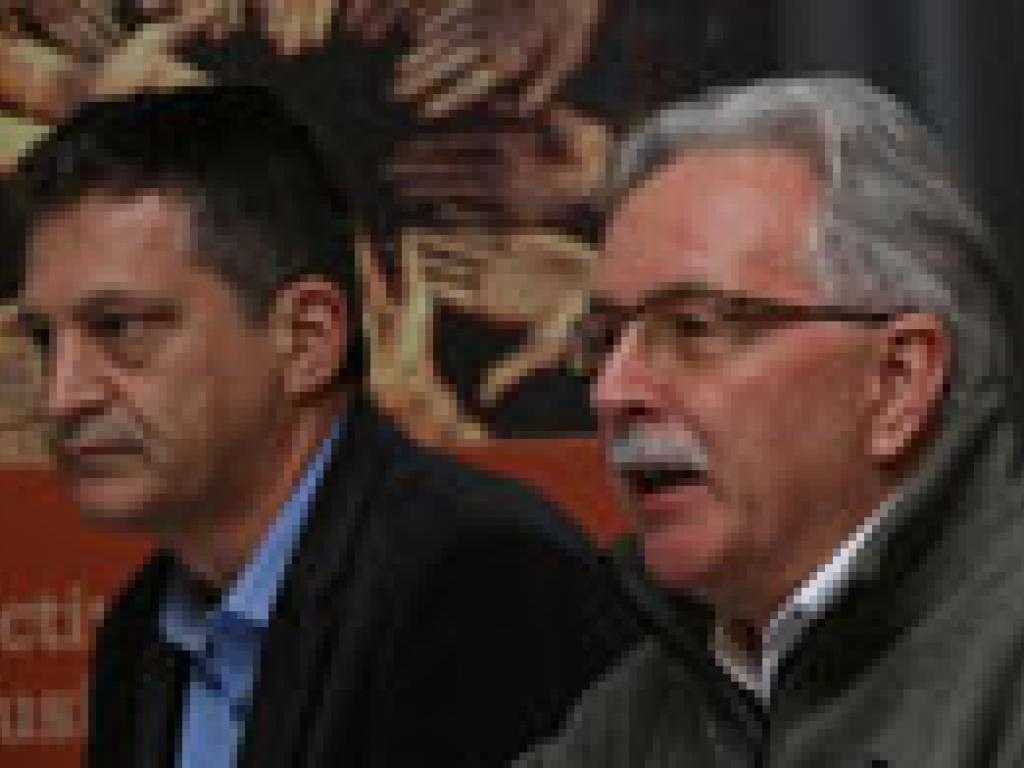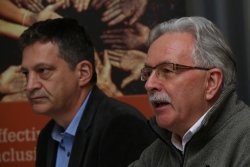ESID Panel Discussion. Making the state work: What we know and what can be done


Chaired by GSDPP Director Professor Alan Hirsch, the panel comprised ESID principal researchers Professors David Hulme, Samuel Hickey and Diana Mitlin of the University of Manchester, and Professor Sohela Nazneen of the University of Dhaka.
Four themes pertaining to "Making the State Work" were explored by the panel:
Professor Hickey drew attention to the increasingly central role politics plays in discussions on inclusive development showing that what matters is the forms of politics and power relations underpinning how institutions emerge and are shaped during political settlements.
Professor Nazneen outlined the thinking behind ESID research exploring women’s political empowerment, and the link between women’s inclusion and women’s influence, using the political settlements lens.
Professor Mitlin shared some key findings from a recent book (Diana Mitlin and David Satterthwaite 2013: Urban Poverty in the Global South: Scale and Nature. London and New York: Routledge). Overall, the authors found that states only work for the urban poor when they are under pressure to do so. This underlines the need for social movements, especially in informal settlements, to organise and develop strategies that challenge adverse political relations and promote democratic processes and responsive accountable government.
In the lively plenary discussion session that followed, questions were raised about the typology used – categorising states as dominant party/leader or states with more electoral competition – and, given different outcomes in specific contexts, how appropriate or flexible the framework is.
Professor Alan Hirsch, Director of GSDPP, thanked the presenters for giving a ‘taste’ of some of the broad themes ESID is addressing, and of two more specific areas of work around gender issues and engaging with the poor, linked to state effectiveness.
Professor David Hulme, Chief Executive Officer of ESID, restated that ESID is exploring issues around inclusion, capacity and commitment to strengthen independent capacity for the analysis of development challenges. Improving the use of governance research evidence in decision-making will lead to more effective policies and programmes and also help donors and governments make value-for-money policy decisions.
ESID (Effective States and Inclusive Development) is a transnational partnership project funded by the UK Department for International Development (DFID) and based at the University of Manchester, which aspires to change how development scholars and practitioners think about inclusion, capacity and commitment. The Graduate School of Development Policy and Practice at the University of Cape Town is a member of the ESID consortium, along with the Institute of Economic Growth, India; BRAC Development Institute, Bangladesh; Chancellor College, The University of Malawi; Centre for Democratic Development, Ghana; the Centre for International Development at the Kennedy School of Government, and Harvard University, United States. Professor Brian Levy, Academic Director of the GSDPP, has been working with ESID since its inception and the GSDPP is involved in a major comparative research programme on the politics and governance of basic education in South Africa (with Bangladesh, Ghana and possibly India as comparators). A second major comparative research proposal on business-state relations in South Africa, India, Turkey and Egypt, is currently under review. This is a cutting edge study using key tools, developed recently in political science, to understand the effectiveness of the state and improve performance.
- The challenge of state effectiveness and the promise of inclusive development by Professor David Hulme, Chief Executive Officer of ESID and professor of Development Studies at Manchester University,
- The importance of thinking politically by Professor Samuel Hickey, ESID Research Director and professor of Politics and Development at Manchester University,
- Gender and political settlements by Professor Sohela Nazneen of the University of Dhaka, and
- When do states work for poor people? by Professor Diana Mitlin, Professor of Global Urbanism and Director of Global Urban Research Centre at the University of Manchester.
Professor Hickey drew attention to the increasingly central role politics plays in discussions on inclusive development showing that what matters is the forms of politics and power relations underpinning how institutions emerge and are shaped during political settlements.
Professor Nazneen outlined the thinking behind ESID research exploring women’s political empowerment, and the link between women’s inclusion and women’s influence, using the political settlements lens.
Professor Mitlin shared some key findings from a recent book (Diana Mitlin and David Satterthwaite 2013: Urban Poverty in the Global South: Scale and Nature. London and New York: Routledge). Overall, the authors found that states only work for the urban poor when they are under pressure to do so. This underlines the need for social movements, especially in informal settlements, to organise and develop strategies that challenge adverse political relations and promote democratic processes and responsive accountable government.
In the lively plenary discussion session that followed, questions were raised about the typology used – categorising states as dominant party/leader or states with more electoral competition – and, given different outcomes in specific contexts, how appropriate or flexible the framework is.
Professor Alan Hirsch, Director of GSDPP, thanked the presenters for giving a ‘taste’ of some of the broad themes ESID is addressing, and of two more specific areas of work around gender issues and engaging with the poor, linked to state effectiveness.
Professor David Hulme, Chief Executive Officer of ESID, restated that ESID is exploring issues around inclusion, capacity and commitment to strengthen independent capacity for the analysis of development challenges. Improving the use of governance research evidence in decision-making will lead to more effective policies and programmes and also help donors and governments make value-for-money policy decisions.
ESID (Effective States and Inclusive Development) is a transnational partnership project funded by the UK Department for International Development (DFID) and based at the University of Manchester, which aspires to change how development scholars and practitioners think about inclusion, capacity and commitment. The Graduate School of Development Policy and Practice at the University of Cape Town is a member of the ESID consortium, along with the Institute of Economic Growth, India; BRAC Development Institute, Bangladesh; Chancellor College, The University of Malawi; Centre for Democratic Development, Ghana; the Centre for International Development at the Kennedy School of Government, and Harvard University, United States. Professor Brian Levy, Academic Director of the GSDPP, has been working with ESID since its inception and the GSDPP is involved in a major comparative research programme on the politics and governance of basic education in South Africa (with Bangladesh, Ghana and possibly India as comparators). A second major comparative research proposal on business-state relations in South Africa, India, Turkey and Egypt, is currently under review. This is a cutting edge study using key tools, developed recently in political science, to understand the effectiveness of the state and improve performance.
